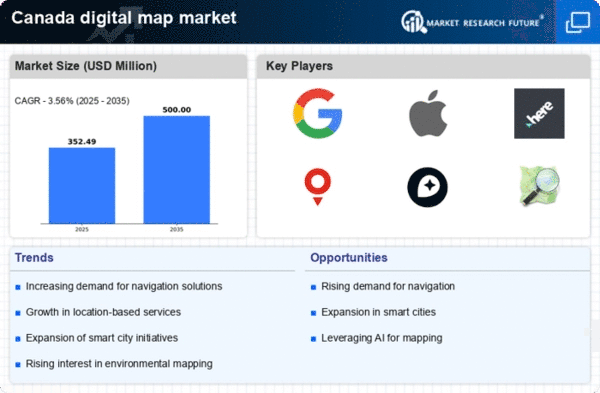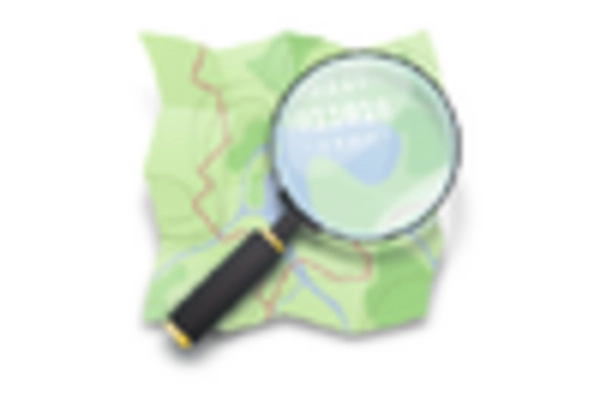Advancements in Geospatial Technology
The digital map market in Canada is experiencing a notable transformation due to advancements in geospatial technology. Innovations such as high-resolution satellite imagery and LiDAR (Light Detection and Ranging) are enhancing the accuracy and detail of digital maps. This technological evolution is likely to drive demand, as businesses and government agencies increasingly rely on precise mapping for decision-making. The integration of 3D mapping capabilities is also becoming prevalent, allowing for more immersive and informative user experiences. As of 2025, the Canadian digital map market is projected to grow at a CAGR of approximately 10%, indicating a robust expansion driven by these technological advancements. The digital map market is thus positioned to benefit significantly from these developments, as they facilitate improved navigation, urban planning, and resource management.
Growing E-commerce and Delivery Services
The expansion of e-commerce and delivery services in Canada is significantly impacting the digital map market. As online shopping continues to gain traction, businesses are increasingly relying on digital mapping solutions to optimize logistics and improve delivery efficiency. Accurate mapping is essential for route planning, ensuring timely deliveries, and enhancing customer satisfaction. The digital map market is likely to see a surge in demand as companies seek to integrate advanced mapping technologies into their operations. With the e-commerce sector projected to grow by over 15% annually, the need for reliable digital mapping solutions will become even more pronounced. This trend highlights the critical role that digital maps play in supporting the logistics and supply chain management of modern businesses.
Rising Demand for Smart City Initiatives
In Canada, the push towards smart city initiatives is significantly influencing the digital map market. Municipalities are increasingly adopting digital mapping solutions to enhance urban planning, traffic management, and public safety. The integration of real-time data into mapping applications allows city planners to make informed decisions that improve infrastructure and service delivery. As cities aim to become more efficient and sustainable, the demand for advanced digital mapping tools is expected to rise. Reports suggest that investments in smart city projects could reach upwards of $100 billion by 2030, further propelling the digital map market. This trend indicates a growing recognition of the importance of digital maps in creating interconnected urban environments, thereby enhancing the overall quality of life for residents.
Enhanced Government Regulations and Standards
In Canada, the digital map market is being shaped by enhanced government regulations and standards aimed at improving data accuracy and accessibility. Regulatory bodies are increasingly mandating the use of standardized mapping data for various applications, including urban planning, environmental monitoring, and emergency response. This regulatory environment is likely to drive the adoption of digital mapping solutions among public sector organizations. As of 2025, it is anticipated that compliance with these regulations will necessitate significant investments in digital mapping technologies, thereby expanding the market. The digital map market is thus positioned to benefit from these developments, as they promote the use of high-quality mapping data that supports informed decision-making across various sectors.
Increased Adoption of Mobile Mapping Applications
The proliferation of smartphones and mobile devices in Canada is driving the adoption of mobile mapping applications, which is a key factor in the growth of the digital map market. As consumers increasingly rely on mobile navigation tools for daily activities, businesses are compelled to invest in location-based services that utilize digital maps. The convenience of accessing maps on-the-go has led to a surge in demand for applications that provide real-time traffic updates, route optimization, and location sharing. It is estimated that the mobile mapping segment could account for over 40% of the total digital map market revenue by 2025. This trend underscores the importance of the digital map market in facilitating seamless navigation and enhancing user experiences in an increasingly mobile-centric world.
















